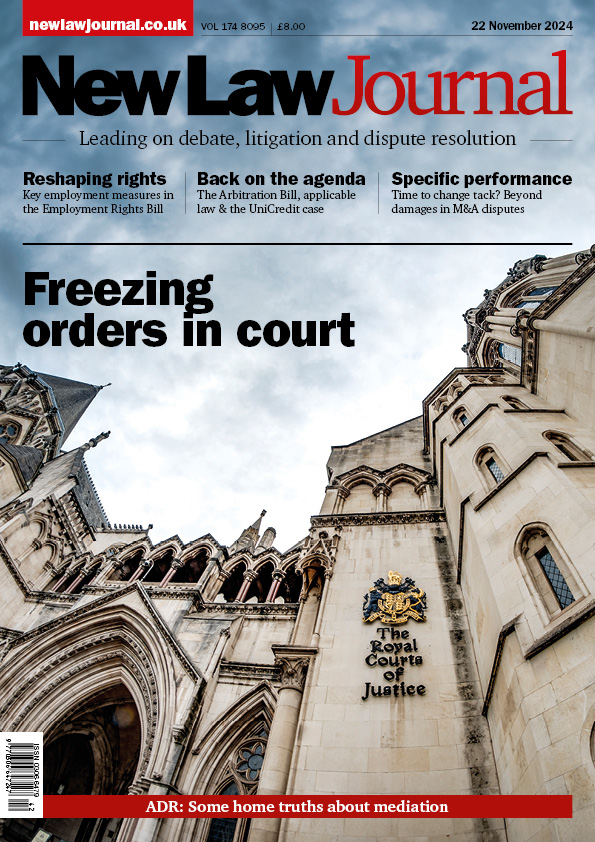THIS ISSUE

John O’Hare states some home truths about mediation
Mark Pawlowski provides a run-down of films featuring thorny legal issues.
The Supreme Court has clarified the role of ‘bad faith’ in invalidating trademarks, in a dispute between a broadcaster and IT company over the word ‘Sky’.
Solicitors could lose their right to handle client money, following the Axiom Ince debacle.
A costs judge has reduced a bill claimed at nearly £260,000 to zero, in a ruling that highlights a gap in legal regulation.
Duty solicitors at police stations will receive an extra £18.5m from 6 December, while legal aid lawyers at youth courts will get a £5.1m boost for the most serious cases, the Lord Chancellor Shabana Mahmood has confirmed.
The Civil Justice Council (CJC) has set out detailed guidelines on evaluating and managing mental capacity—an area of procedure that was previously unclear.
A case management portal and two websites will be launched by the Supreme Court and Judicial Committee of the Privy Council next month, to streamline permission to appeal applications and make ‘interactions with the court as effortless as possible’.
The Legal Services Board (LSB) is consulting on draft guidance for regulators on their duty to ‘promote the prevention and detection of economic crime’.
MOVERS & SHAKERS

Boies Schiller Flexner—Tim Smyth
Firm promotes London international arbitration specialist to partnership

Katten Muchin Rosenman—James Davison & Victoria Procter
Firm bolsters restructuring practice with senior London hires
.tmb-mov69x69.jpg?sfvrsn=775f80cc_1)
HFW—Guy Marrison
Global aviation disputes practice boosted by London partner hire
NEWS
Writing in NLJ this week, NLJ columnist Dominic Regan surveys a landscape marked by leapfrog appeals, costs skirmishes and notable retirements. With an appeal in Mazur due to be heard next month, Regan notes that uncertainties remain over who will intervene, and hopes for the involvement of the Lady Chief Justice and the Master of the Rolls in deciding the all-important outcome
After the Southport murders and the misinformation that followed, contempt of court law has come under intense scrutiny. In this week's NLJ, Lawrence McNamara and Lauren Schaefer of the Law Commission unpack proposals aimed at restoring clarity without sacrificing fair trial rights
The latest Home Office figures confirm that stop and search remains both controversial and diminished. Writing in NLJ this week, Neil Parpworth of De Montfort University analyses data showing historically low use of s 1 PACE powers, with drugs searches dominating what remains
Boris Johnson’s 2019 attempt to shut down Parliament remains a constitutional cautionary tale. The move, framed as a routine exercise of the royal prerogative, was in truth an extraordinary effort to sideline Parliament at the height of the Brexit crisis. Writing in NLJ this week, Professor Graham Zellick KC dissects how prorogation was wrongly assumed to be beyond judicial scrutiny, only for the Supreme Court to intervene unanimously
A construction defect claim in the Court of Appeal offers a sharp lesson in pleading discipline. In his latest 'Civil way' column for NLJ, Stephen Gold explains how a catastrophically drafted schedule of loss derailed otherwise viable claims. Across the areas explored in this week's column, the message is consistent: clarity, economy and proper pleading matter more than ever









